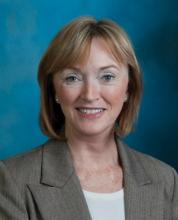User login
NEW ORLEANS – The continuing onslaught of digital demands is overwhelming many practices’ ability to keep up, driving efficiency down and costs up. The Centers for Medicare and Medicaid Services wants to show that it feels physicians’ pain, and has launched what it calls its "eHealth" initiative to better coordinate and streamline the requests that come out of its offices.
The agency unveiled the initiative at the Healthcare Information and Management Systems Society Annual Conference and exhibition here, with officials telling attendees in multiple sessions – and with an exhibit hall booth and full-page ad in the daily meeting newspaper – how they plan to start paring down demands.
The initiative is the result of at least 18 months of strategizing within the Department of Health and Human Services (HHS) and represents just the beginning of a transformation, Robert Tagalicod, director of the CMS’s Office of E-Health Standards and Services, said in an interview.
HHS officials wanted to curb what they acknowledge is a huge – and growing – regulatory burden for physicians and other health care providers in the information technology area. Much of the focus was on how to better align rules and policies that come out of the CMS with those issued by the Office of the National Coordinator (ONC), which is located within the Office of the Secretary of HHS.
Among other things, the CMS set up a dedicated website for the initiative, www.cms.gov/eHealth, and a listserv that will "act as a central hub of information on implementation, guidance, milestones, and critical steps so that providers and other stakeholders have a single source of information on coordinating efforts toward implementing ICD-10, EHRs and meaningful use, operating standards, electronic quality measurement, and payment models," according to a blog post by Mr. Tagalicod.
The initiative aims to get more physicians using ICD-10, with which they must comply by Oct. 14, 2014. Although the move to that new coding system has been delayed several times, it will not be again, according to CMS Acting Administrator Marilyn Tavenner. "ICD-10 will go forward as designed," Ms. Tavenner told HIMSS13 attendees.
To make it easier for clinicians, the CMS and the ONC are talking about making use of ICD-10 eligible for an incentive payment under stage 3 of the meaningful use program, said Mr. Tagalicod.
In the quality arena, the CMS is going to align measurements with the six core areas set out by the National Quality Strategy. Wherever possible, quality measures will be made similar across CMS programs, said Dr. Kate Goodrich, acting director of the quality measurement and health assessment group at CMS’s Center for Clinical Standards and Quality.
For physicians, that means aligning the measures in the Physician Quality Reporting System with those required for meaningful use, for the Physician Value Modifier (PVM), and for the Medicare Shared Savings Program, said Dr. Goodrich. "The goal is report once – that’s become our mantra," she said. Physicians would report once and get credit for all the programs.
Ms. Tavenner told attendees the agency understands that, over the years, the quality of care programs had become "not easy to understand and even more difficult to implement." Now, the agency has "tried to reduce measures, align measures across programs, and become more focused on outcomes, less on process," she said, adding, "We want your feedback on that."
The eHealth initiative is also working with the National Quality Forum on a task force that aims to come up with a core set of measures that can be used across all payers, not just federal payers.
Part of the eHealth rollout included a "request for information" from health information technology companies on how to accelerate the exchange of data. "Our focus has to be on interoperability this year and we need your help in understanding what is working and where we are going to need to put additional resources," Ms. Tavenner said.
The CMS and other health agencies also are looking ahead to the future, Mr. Tagalicod said – what might happen 10 years down the road in a very quickly developing area. Among the developments the agency is monitoring: mobile health, data exchange in real time, and predictive health.
In the meantime, a big focus will be on "outreach, education, and training to providers" to help them "adopt a whole slew of eHealth," he noted.
"We want to get all the stakeholders together and say: How can we make this all better in a way that we plan it with clear goals, with clear milestones, and with clear roles and responsibilities?" he said.
NEW ORLEANS – The continuing onslaught of digital demands is overwhelming many practices’ ability to keep up, driving efficiency down and costs up. The Centers for Medicare and Medicaid Services wants to show that it feels physicians’ pain, and has launched what it calls its "eHealth" initiative to better coordinate and streamline the requests that come out of its offices.
The agency unveiled the initiative at the Healthcare Information and Management Systems Society Annual Conference and exhibition here, with officials telling attendees in multiple sessions – and with an exhibit hall booth and full-page ad in the daily meeting newspaper – how they plan to start paring down demands.
The initiative is the result of at least 18 months of strategizing within the Department of Health and Human Services (HHS) and represents just the beginning of a transformation, Robert Tagalicod, director of the CMS’s Office of E-Health Standards and Services, said in an interview.
HHS officials wanted to curb what they acknowledge is a huge – and growing – regulatory burden for physicians and other health care providers in the information technology area. Much of the focus was on how to better align rules and policies that come out of the CMS with those issued by the Office of the National Coordinator (ONC), which is located within the Office of the Secretary of HHS.
Among other things, the CMS set up a dedicated website for the initiative, www.cms.gov/eHealth, and a listserv that will "act as a central hub of information on implementation, guidance, milestones, and critical steps so that providers and other stakeholders have a single source of information on coordinating efforts toward implementing ICD-10, EHRs and meaningful use, operating standards, electronic quality measurement, and payment models," according to a blog post by Mr. Tagalicod.
The initiative aims to get more physicians using ICD-10, with which they must comply by Oct. 14, 2014. Although the move to that new coding system has been delayed several times, it will not be again, according to CMS Acting Administrator Marilyn Tavenner. "ICD-10 will go forward as designed," Ms. Tavenner told HIMSS13 attendees.
To make it easier for clinicians, the CMS and the ONC are talking about making use of ICD-10 eligible for an incentive payment under stage 3 of the meaningful use program, said Mr. Tagalicod.
In the quality arena, the CMS is going to align measurements with the six core areas set out by the National Quality Strategy. Wherever possible, quality measures will be made similar across CMS programs, said Dr. Kate Goodrich, acting director of the quality measurement and health assessment group at CMS’s Center for Clinical Standards and Quality.
For physicians, that means aligning the measures in the Physician Quality Reporting System with those required for meaningful use, for the Physician Value Modifier (PVM), and for the Medicare Shared Savings Program, said Dr. Goodrich. "The goal is report once – that’s become our mantra," she said. Physicians would report once and get credit for all the programs.
Ms. Tavenner told attendees the agency understands that, over the years, the quality of care programs had become "not easy to understand and even more difficult to implement." Now, the agency has "tried to reduce measures, align measures across programs, and become more focused on outcomes, less on process," she said, adding, "We want your feedback on that."
The eHealth initiative is also working with the National Quality Forum on a task force that aims to come up with a core set of measures that can be used across all payers, not just federal payers.
Part of the eHealth rollout included a "request for information" from health information technology companies on how to accelerate the exchange of data. "Our focus has to be on interoperability this year and we need your help in understanding what is working and where we are going to need to put additional resources," Ms. Tavenner said.
The CMS and other health agencies also are looking ahead to the future, Mr. Tagalicod said – what might happen 10 years down the road in a very quickly developing area. Among the developments the agency is monitoring: mobile health, data exchange in real time, and predictive health.
In the meantime, a big focus will be on "outreach, education, and training to providers" to help them "adopt a whole slew of eHealth," he noted.
"We want to get all the stakeholders together and say: How can we make this all better in a way that we plan it with clear goals, with clear milestones, and with clear roles and responsibilities?" he said.
NEW ORLEANS – The continuing onslaught of digital demands is overwhelming many practices’ ability to keep up, driving efficiency down and costs up. The Centers for Medicare and Medicaid Services wants to show that it feels physicians’ pain, and has launched what it calls its "eHealth" initiative to better coordinate and streamline the requests that come out of its offices.
The agency unveiled the initiative at the Healthcare Information and Management Systems Society Annual Conference and exhibition here, with officials telling attendees in multiple sessions – and with an exhibit hall booth and full-page ad in the daily meeting newspaper – how they plan to start paring down demands.
The initiative is the result of at least 18 months of strategizing within the Department of Health and Human Services (HHS) and represents just the beginning of a transformation, Robert Tagalicod, director of the CMS’s Office of E-Health Standards and Services, said in an interview.
HHS officials wanted to curb what they acknowledge is a huge – and growing – regulatory burden for physicians and other health care providers in the information technology area. Much of the focus was on how to better align rules and policies that come out of the CMS with those issued by the Office of the National Coordinator (ONC), which is located within the Office of the Secretary of HHS.
Among other things, the CMS set up a dedicated website for the initiative, www.cms.gov/eHealth, and a listserv that will "act as a central hub of information on implementation, guidance, milestones, and critical steps so that providers and other stakeholders have a single source of information on coordinating efforts toward implementing ICD-10, EHRs and meaningful use, operating standards, electronic quality measurement, and payment models," according to a blog post by Mr. Tagalicod.
The initiative aims to get more physicians using ICD-10, with which they must comply by Oct. 14, 2014. Although the move to that new coding system has been delayed several times, it will not be again, according to CMS Acting Administrator Marilyn Tavenner. "ICD-10 will go forward as designed," Ms. Tavenner told HIMSS13 attendees.
To make it easier for clinicians, the CMS and the ONC are talking about making use of ICD-10 eligible for an incentive payment under stage 3 of the meaningful use program, said Mr. Tagalicod.
In the quality arena, the CMS is going to align measurements with the six core areas set out by the National Quality Strategy. Wherever possible, quality measures will be made similar across CMS programs, said Dr. Kate Goodrich, acting director of the quality measurement and health assessment group at CMS’s Center for Clinical Standards and Quality.
For physicians, that means aligning the measures in the Physician Quality Reporting System with those required for meaningful use, for the Physician Value Modifier (PVM), and for the Medicare Shared Savings Program, said Dr. Goodrich. "The goal is report once – that’s become our mantra," she said. Physicians would report once and get credit for all the programs.
Ms. Tavenner told attendees the agency understands that, over the years, the quality of care programs had become "not easy to understand and even more difficult to implement." Now, the agency has "tried to reduce measures, align measures across programs, and become more focused on outcomes, less on process," she said, adding, "We want your feedback on that."
The eHealth initiative is also working with the National Quality Forum on a task force that aims to come up with a core set of measures that can be used across all payers, not just federal payers.
Part of the eHealth rollout included a "request for information" from health information technology companies on how to accelerate the exchange of data. "Our focus has to be on interoperability this year and we need your help in understanding what is working and where we are going to need to put additional resources," Ms. Tavenner said.
The CMS and other health agencies also are looking ahead to the future, Mr. Tagalicod said – what might happen 10 years down the road in a very quickly developing area. Among the developments the agency is monitoring: mobile health, data exchange in real time, and predictive health.
In the meantime, a big focus will be on "outreach, education, and training to providers" to help them "adopt a whole slew of eHealth," he noted.
"We want to get all the stakeholders together and say: How can we make this all better in a way that we plan it with clear goals, with clear milestones, and with clear roles and responsibilities?" he said.
AT THE HIMSS13 ANNUAL MEETING


